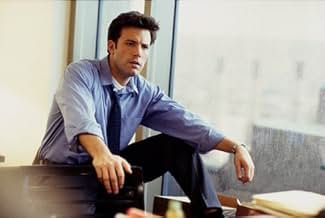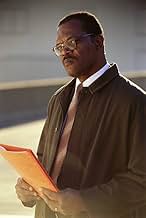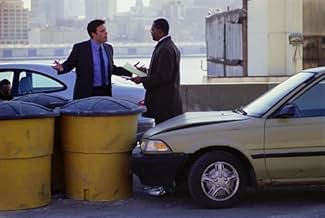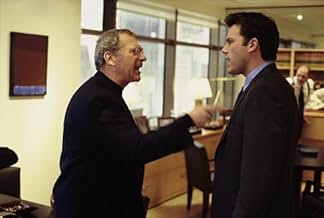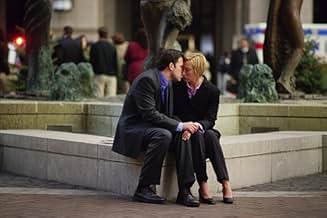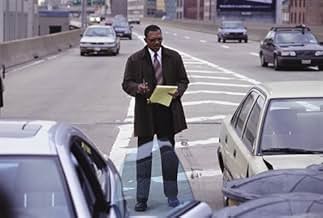La historia de como un accidente de coche en Nueva York se convierte en una guerra entre un joven abogado y un hombre de negocios.La historia de como un accidente de coche en Nueva York se convierte en una guerra entre un joven abogado y un hombre de negocios.La historia de como un accidente de coche en Nueva York se convierte en una guerra entre un joven abogado y un hombre de negocios.
- Premios
- 7 nominaciones en total
- Mina Dunne
- (as Jennifer Dundas Lowe)
- Gina Gugliotta
- (as Lisa Leguillou)
Argumento
¿Sabías que...?
- CuriosidadesA day after the terrorist attacks of September 11, 2001, director Roger Michell had the World Trade Center towers digitally removed from the opening main title sequence in the film. In the DVD commentary, he admitted that it was a mistake to erase them, and make it appear as if they did not exist. During the re-editing of the film, Michell reinserted them as a tribute.
- PifiasWhen Gavin Lights the paper on fire and raises it to the sprinkler head, that type of sprinkler head would only discharge the water. No other heads would spray water. The reason for this is to minimize damage.
- Citas
Doyle Gipson: I hope you don't mind, but I was intrigued by your conversation. I just thought you were in advertising. So I want to give you my dream version of a Tiger Woods commercial, okay? There's this black guy on a golf course. And all these people are trying to get him to caddy for them, but he's not a caddy. He's just a guy trying to play a round of golf. And these guys give him a five-dollar bill and tell him to go the clubhouse and get them cigarettes and beer. So, off he goes, home, to his wife and to their little son, who he teaches to play golf. You see all the other little boys playing hopscotch while little Tiger practices on the putting green. You see all the other kids eating ice cream while Tiger practices hitting long balls in the rain while his father shows him how. And we fade up, to Tiger, winning four Grand Slams in a row, and becoming the greatest golfer to ever pick up a 9-iron. And we end on his father in the crowd, on the sidelines, and Tiger giving him the trophies. All because of a father's determination that no fat white man - like your fathers, probably - would ever send his son to the clubhouse for cigarettes and beer.
- Créditos adicionalesThanks to the staff and Militia Force members and veterans at the Marcy Avenue Armory, Brooklyn, New York.
- Versiones alternativasThere was an early review of the movie that contained a spoiler of the ending. The ending that was originally used involved Ben Affleck and Samuel L. Jackson getting into a fist fight that leads onto the balcony. They talk about right and wrong and Affleck takes the file and tears it up and the movie fades to credits. This ending was most likely cut because test audiences did not like it. It will most likely appear on the DVD. Also a small clip shown in the TV ads shows Affleck and Jackson fighting on the balcony. This was part of the original ending which explains why it was cut.
- ConexionesFeatured in Changing Lanes: The Writer's Perspective (2002)
Affleck plays the role of the oddly named Gavin Banek (did they take the name Ben Affleck', throw it in a blender, and add some new letters for good measure?), a high-power lawyer on the verge of becoming one of the partners at his law firm, alongside his father-in-law. Jackson is Doyle Gibson, a reforming alcoholic father of two clawing his way out of his hole and trying to save his marriage. On a critical day in both their lives, Doyle going to court to try winning joint-custody, and Gavin on his way to seal his career-making case, the two get into a minor accident on the FDR turnpike, causing Doyle to miss his hearing and Gavin to accidentally give Doyle a signed document that is critical to his case and it all unravels from there.
The two tumble in a daylong haze of malice and self-destruction, sabotaging each other's lives. Whenever either decides to throw in the towel and do the right' thing, it is too late and the other has already escalated it to the next level. His life quickly falling down around him, Gavin begins to examine it for the first time, taking a deep look into his wife, his law firm, his boss/father-in-law, and himself ultimately questioning his motivation for trying to retrieve the document in the first place.
This is where the film really shines: many movies ask the question what makes a man?' but `Changing Lanes' does it with honestly and authenticity. The screenplay, by Chap Taylor, asks if it is success, or if its providing for one's wife and kids, or if its true goodness, avoiding superficiality and delving into the motivations for each. In one telling monologue, Gavin's father-in-law, played with perfect tone by Sydney Pollack, says, `At the end of the day, I do more good than harm. What other standard have I got?' Unfortunately, the movie does not really ask the question of what makes a woman, even though both wives show real strength. The movie does not even seem to suggest that Gavin and Doyle's struggles could even be applied to women (obviously they could, had the movie explored that).
Jackson, always an excellent actor, is great as Gibson even if he has performed better before. Surprisingly, in this film Affleck's acting actually seems to surpass Jackson's in this amazing performance that is probably the best we have seen from Affleck so far.
All of the characters in the film, including minor-roles and extras, all exhibit a very human feel, and seeing real-feeling people on the screen has always been something rare and not to be taken for granted. The viewer comes to care about everyone in the picture: Gavin, Doyle, their wives, the guy at the bank, even the stranger at the bar.
New York City itself is alive in this movie: it breathes, coughs, and gasps with Salvatore Totino's shaky, unsaturated, claustrophobic photography. Totino really looks at people and the city in the face, and does not try to make them prettier or uglier than they are. David Arnold's original electronic score is a refreshing change from the very poor attempts at orchestral music that most movies are now filled with. Arnold's score very effectively sets the mood and reinforces the tempo of the movie.
`Changing Lanes' is a success for Roger Michell that shows us that a movie can have major stars, be entertaining, glossy, substantial, and pensive all-at-once.
`Changing Lanes' is rated R for a fender-bender, destruction of office equipment, unseen infidelity, a shot of the World Trade Center, and honest depiction of the human condition.
- sumitagarwal
- 8 abr 2002
- Enlace permanente
Selecciones populares
- How long is Changing Lanes?Con tecnología de Alexa
Detalles
Taquilla
- Presupuesto
- 45.000.000 US$ (estimación)
- Recaudación en Estados Unidos y Canadá
- 66.818.548 US$
- Fin de semana de estreno en EE. UU. y Canadá
- 17.128.062 US$
- 14 abr 2002
- Recaudación en todo el mundo
- 94.935.764 US$
- Duración1 hora 38 minutos
- Color
- Mezcla de sonido
- Relación de aspecto
- 2.35 : 1
Contribuir a esta página



